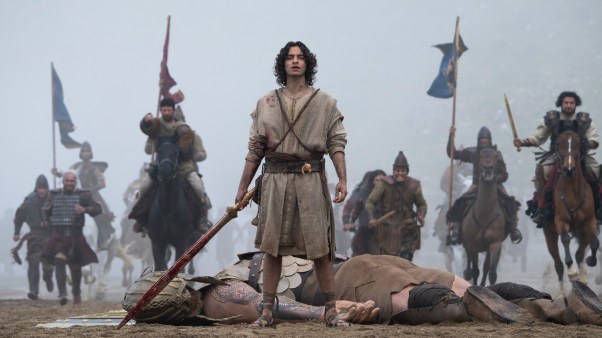Innocent III, the pope who moved to crush the Cathars (see last week’s Christian History Corner), also accidentally struck at an even bigger “heresy”: Eastern Orthodoxy. Though personally tolerant of Eastern Christian rites, he mustered the disastrous Fourth Crusade, which in 1204 forever impaired East-West relations by sacking Constantinople. However, as historian Tia M. Kolbaba ably demonstrates in The Byzantine Lists: Errors of the Latins (University of Illinois), the gulf between Western “Latins” and Eastern “Greeks” goes much deeper.
The Byzantine lists, which detailed the errors of the Western church, were written by educated Greek clergy for Greek lay persons to discourage them from picking up Latin practices from visiting crusaders or other contacts with the West. The first list (not counting a list-like 867 encyclical from Patriarch Photios) was written by Patriarch Keroularios, or Cerularius, in 1054, in reaction to a list of Greek errors handed to him by Pope Leo IX’s representative, Cardinal Humbert. Keroularios and Humbert excommunicated each other, leading to the familiar designation of 1054 as the date of the Great Schism. Keroularios’s list would be copied and expanded upon, then joined with other lists, through 1281. The number of Latin errors identified eventually reached 75.
According to Kolbaba, historians have never really studied the lists because of their unusual content: a mixture of theological, liturgical, and seemingly personal disagreements. Keroularios’s list accuses Latins of, among other things, using unleavened bread in the Eucharist, eating unclean meats, shaving, adding “and the Son” to the Nicene Creed (the “filioque” clause), forbidding priests to marry, allowing bishops to wear rings, and baptizing with only one immersion. Keroularios sums up by saying, “Therefore, if they live in such a way and, enfeebled by such customs, dare these things which are obviously lawless, forbidden, and abominable, then will any right-thinking person consider that they are at all to be included in the category of the orthodox? I think not.”
In the lists, we see one of the main differences between Western and Eastern thought. Latin antiheretical works focused on doctrinal differences, but to Greeks, Kolbaba writes, “It is the things these ‘Romans’ do—not what they believe and teach—that place them beyond the pale.” To Latins, practice, including liturgy, is an outgrowth of doctrine and therefore secondary; to Greeks, practice shapes belief and is therefore of ultimate importance.
Given this wholly different mindset, Westerners tend to look at the Byzantine lists and see complaints so odd, so trivial, that they must mask something else. Kolbaba looks and argues, “To say that such matters are petty or trivial reflects a very modern and very intellectual bias. Why are we so sure that the doctrinal content of a religion is more important, more central, and more characteristic than its ritual and normative content?”
Kolbaba’s meticulous scholarship will make this an eye-opening book for Byzantinists (all five of you out there), while her conclusions—like “Byzantines were conservative only in their dreams” and “We tend to accuse our enemies of what we most hate and fear in ourselves”—keep it from becoming an eye-drooping read for the rest of us. Perhaps most relevant for students of Christian history is her view that the lists, and her treatment of them, “suggest a new synthesis, based on the hypothesis that religion and the rest of society are inseparable, and that the debate about religion versus other factors is sterile.” I have to applaud a scholar who can start with a pile of obscure Greek manuscripts and arrive at—and support—a conclusion like that.
Elesha Coffman is associate editor of Christian History.
Related Elsewhere
For more on Eastern Orthodoxy, see issue 54 of Christian History magazine. The text is available online, but the print magazine version is, like all issues of the Christianity Today sister publication, highly illustrated:
Tia M. Kolbaba’s The Byzantine Lists is available at Amazon.com and other book retailers. More information on the book is available from University of Illinois Press, while more information on Kolbaba is available from Princeton.
Christian History Corner appears every Friday at ChristianityToday.com. Previous Christian History Corners include:
“Kill Them All” | The medieval church was deadly serious about eliminating ‘heretical’ Cathars. (Sept. 11, 2000)
All Together Now | What qualifies as an ecumenical council anyway? (Sept. 1, 2000)
Soviets, Schism, and Sabotage | How the government manipulated division in the Russian Orthodox Church. (Aug. 18, 2000)
Sacrifice at Sea | The story that wasn’t in James Cameron’s Titanic. (Aug. 11, 2000)
Colonial Soul | The Cross and The Tomahawk series examines our nation’s past from many perspectives. (Aug. 4, 2000)
The Fifth Evangelist | Johann Sebastian Bach was a musician “who lived the Bible.” (July 28, 2000)
How the Other Half Lived | Chronicling the forgotten gender in the Bible and church history. (July 21, 2000)
A Cure for Cliophobia | While not for “dummies” or “complete idiots,” a new guide introduces church history to the beginner. (July 14, 2000)
New Stabs at Old Wounds | Why Northern Ireland doesn’t always love a parade. (July 7, 2000)
Camp Fire | The earliest recorded Methodist camp meeting in America took place 200 years ago this week. (June 30, 2000)
For Better or Worse | The diaries of a frontier missionary couple reveal starkly differing perspectives. (June 23, 2000)
Like Father, Like Son | The Mather men followed the faith—and career paths—of their fathers. (June 16, 2000)
Agent of Grace | PBS’s Bonhoeffer film shows us a theologian in action. (June 9, 2000)
Copyright © 2000 Christianity Today. Click for reprint information.








